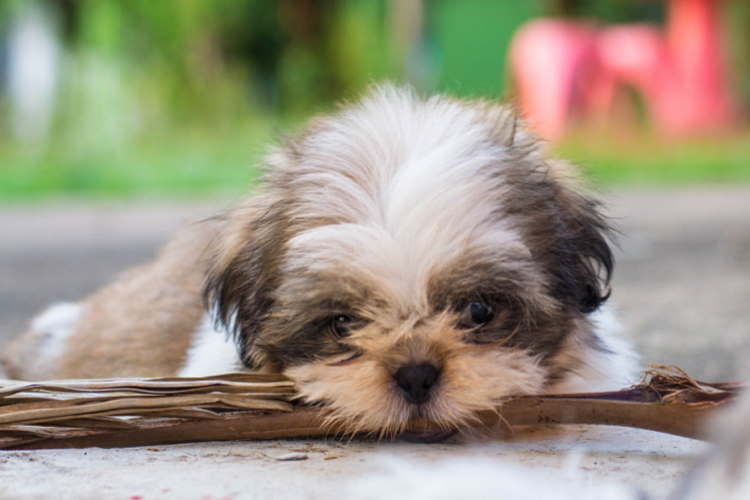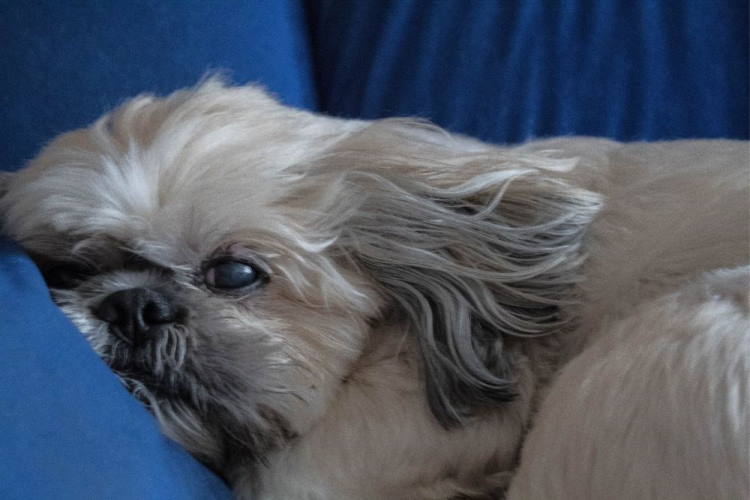Do Shih Tzu Growl a Lot?
BY MOLLY | EVERYTHINGSHIHTZU.COM
This post may contain affiliate links. Read privacy & disclosure policy for info
If you're snuggling with your adorable Shih Tzu, and suddenly they start to growl, you might be a little concerned.
Your initial worry could be something like, "What if my dog is aggressive?" However, don't jump to conclusions just yet about your pup's growls.
Shih Tzu are typically happy dogs and don't tend to growl any more than other pups. However, growling can mean many things, and it isn't always a sign of aggression.
Therefore, if your Shih Tzu is growling, it's best to know the possible reasons why.

Dogs communicate with a whole series of sounds, body positions, and gestures. Often, it's the combination of these things that allow your dog to tell you what they're thinking about or what they need.
Growling is one of many ways your dog communicates vocally, and it can mean a bunch of different things.
Why Does My Shih Tzu Growl?
Your Shih Tzu, like most dogs, will growl if they feel threatened, warning others to back off.
However, these cute little lion dogs are pretty happy-go-lucky, so you may not notice this happening too often.
However, dogs also growl to show nervousness or fear when they feel pain and sometimes even play.
Growling as a Warning
If your pup's growl accompanies a confident stance, ears up, and a tight-lipped mouth full of teeth, they're on alert and saying "back off."
If they start to lean or step forward, ears back, then they're telling you to "back off now." This type of growl is typically loud and constant, perhaps even mixed in with a few snarls.
It's a significant warning and could escalate to aggression quickly, especially if ignored.
If your dog is guarding their territory or possessions, the growl might be a bit more subdued, meant only to be a warning and not intended as anything aggressive.
Your dog might not even make eye contact, trying to keep themselves in check while hopefully getting rid of the perceived threat.
When a dog looks away from you or avoids eye contact, it's their way of diffusing what they feel is a tense situation.
Growling When Scared
A frightened or anxious dog doesn't want to fight; they want whatever scares them or makes them nervous to go away. In this case, your pup will attempt to make themselves appear threatening through growling.
You might notice their ears are back, and their overall body position is slightly lower to the ground, or they might be holding their head down a bit.
Your dog may also even back up a few steps.
Growling When in Pain
Just like you might feel grumpier when you aren't feeling well, your dog might growl when they're in pain.
You might notice that your pup starts to growl more when you touch them in a particular spot or pick them up. If the pain is really bad, your pup might even nip, but this isn't true aggression.
Your dog is hurting and likely confused about why you (or the vet) are messing with him. He then responds through a growl, but he's just saying, "Ouch, that hurts, stop it."
Growling to Play or When Happy
Yep, this is why growling could get a little confusing for some pet parents.
Yes, growling often signals some type of negative emotion. However, it can also show that your dog is happy and in a playful mood.
For growls that are shorter, lower, or accompanied by relaxed body language, the odds are good that these growls are positive.
For example, your dog might crouch down with their butt in the air, ready to play. They might also show their teeth in a crazy grin, but the mouth will be more relaxed, they'll bounce around, or some combination of all of these things.
Your dog may even growl if they want to play, and nobody is responding.
For example, my pup has a ball he absolutely loves to play fetch with.
He'll bring it over and drop it by my feet, and if I am doing something else or take too long, he'll start to do this series of little light, short growls.
At the same time, he's picking his paws up and down and wagging his tail, basically saying, "Hurry up, Mom! It's right there!"
What Should I Do If My Shih Tzu Is Growling?

If your Shih Tzu is growling, you need to become a detective and do a little bit of investigating.
Consider the growling in the context of the moment and pay attention to your dog's body posture and behavior.
Putting all of these things together, you should be able to determine the reason for your pup's growls.
Once you know the cause, you can take the proper steps to remedy the situation.
If your dog's growling because they want to play or they're happy, then you don't need to do much. In fact, you could keep doing whatever you're doing because your furry friend is having a ball.
However, whether your dog is playing with you, someone else, or another dog, if the growls start to change or your dog starts to nip or lunge, then it's best to end the game before things get out of hand.
If your dog's growl is a warning, whether protecting food, toys, or territory, then at the moment, don't push the issue. However, it's essential to start working with your dog as early as possible to avoid problems with food aggression, etc.
In addition, your dog should not feel a need to warn members of the family to back off from the food dish or dog bone.
Therefore, some training and desensitizing might be in order.
If you're unsure how to work with your pup, consult with your vet or a professional trainer.
If you suspect pain to be the root of your dog's growls, make a vet appointment. Likewise, if your dog has started growling aggressively and showing other signs of aggression, you need to talk to your vet.
Plus, anytime your pup starts to display aggressive behavior, remove your dog from the situation immediately.
Always Listen To and Watch Your Dog's Cues
While some breeds are more prone to aggressive-type behaviors than others, the Shih Tzu tends to be relatively happy pups.
They want nothing more than to spend time with their family and are affectionate sweethearts. However, every dog can have a bad day, so always pay attention to what your canine companion is trying to tell you.
You never want to ignore your dog's communication attempts.
If your pup's growls signal a more serious issue, the sooner you address it, the better.
Posted 6/1/2021



